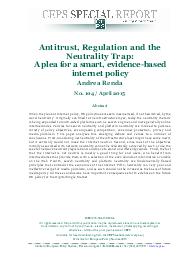Terzi, Alessio, (2015), “No coordination without representation”, Bruegel publications. 8 Οκτωβρίου Further democratic legitimacy is a pre-requisite to economic union. This article explores how economic policies in the euro area should be coordinated, but this cannot be done in a mechanical rules-based manner. Arguing the contrary suggests a cavalier understanding of the complexity of economic policymaking. Σχετικές Αναρτήσεις Maçães, Bruno, (2015), «The missing piece in the EMU puzzle: Economic policy …Read More
The sticky superpower
Economist, (2015), “The sticky superpower”, Special Report, 3 Οκτωβρίου IN JUNE THIS year Jack Ma, the founder of Alibaba, a giant Chinese e-commerce firm, addressed the Economic Club of New York, whose members include many Manhattan luminaries and Wall Street chiefs. Mr Ma’s message was that his company exists for the long-term good of society, a far cry from the creed of shareholder value followed by many in the room. …Read More
Strengthening the beating heart of the European economy
Harbour, Malcolm, (2015), “Strengthening the beating heart of the European economy”, European Policy Centre Publications, 29 Σεπτεμβρίου In an atmosphere of crisis, distrust and fragmentation, policy-makers in Brussels are mostly focused on fighting fire without having an ambitious vision for the future – in effect, muddling through, as has been the characteristic response in recent years. However, by remaining in crisis response mode, the European Union (EU) is failing to provide …Read More
The political economy of liberal democracy
Mukand, Sharun, Rodrik, Dani, (2015), “The political economy of liberal democracy“, Voxeu, 29 Σεπτεμβρίου There are more democracies in the world than non-democracies, but few of the democracies go beyond electoral competition. This column highlights the contrast between electoral democracies and liberal ones, that is, those that protect civil rights in addition to political and property rights. Liberal democracies are rare because the failure to protect minority rights is a common consequence of the …Read More
A Strategy for Resolving Europe’s Problem Loans
Aiyar, Shekhar, Ilyina, Anna, (2015), “A Strategy for Resolving Europe’s Problem Loans”, IMF Direct blog, 24 Σεπτεμβρίου Problem loans are clogging the arteries of Europe’s banking system. The global financial crisis and subsequent recession have left businesses and households in many countries with debts that they cannot repay. Nonperforming loans as a share of total loans in the EU have more than doubled since 2009, reaching €1 trillion—over 9 percent of the region’s …Read More
Lessons for Greece: Forcible currency conversions from 1982 to 2015
Reinhart, Carmen, (2015), “Lessons for Greece: Forcible currency conversions from 1982 to 2015”, Voxeu, 9 Ιουλίου Contrary to the intent of the designers of what was to be an irreversible currency union, Greece may well exit the Eurozone. This column argues that default does not inevitably trigger the introduction of a new currency (or the re-activation of an old one). However, if ‘de-euroisation’ is the end game, then a forcible …Read More
Antitrust, Regulation and the Neutrality Trap: A plea for a smart, evidence-based internet policy
Renda, A. (2015) “Antitrust, Regulation and the Neutrality Trap: A plea for a smart, evidence-based internet policy, CEPS Special Report Νο. 104, 17 Απριλίου. When they look at Internet policy, EU policymakers seem mesmerised, if not bewitched, by the word ‘neutrality’. Originally confined to the infrastructure layer, today the neutrality rhetoric is being expanded to multi-sided platforms such as search engines and more generally online intermediaries. Policies for search …Read More
The Real Thing: An Anti-austerity European Government
Galbraith, K. J. (2015) “The Real Thing: An Anti-austerity European Government“, Social Europe Journal, 07 Απριλίου. I have just come from Athens where I have, for the last several days, had the high privilege of working with the government of Greece, and especially with the Finance Minister, my very good friend, Yanis Varoufakis. I’ve actually had two occasions, so far, to observe the drama that’s unfolding in Europe from …Read More
Fiscal Policy And Structural Reform
Gaspar, V. (2015) “Fiscal Policy And Structural Reform“, iMFdirect, 27 Μαρτίου. One of the big questions to emerge from the global financial crisis, especially in the euro area, is how to raise a country’s potential growth while restoring healthy public finances. For example, the euro area— despite some favorable news recently — faces marked-down growth prospects alongside high levels of public debt. The combination of high debt and tepid …Read More
Should the UK stay or go? The economic consequences of Britain leaving the EU
Dhingra, S., Ottaviano, G. & Sampson, T. (2015) “Should the UK stay or go? The economic consequences of Britain leaving the EU“, LSE EUROPP, 24 Μαρτίου. How would a British exit from the EU affect the UK’s economy? Swati Dhingra, Gianmarco Ottaviano and Thomas Sampson outline the economic consequences of a Brexit, writing that reduced integration with EU countries is likely to cost the UK economy far more than is gained …Read More





